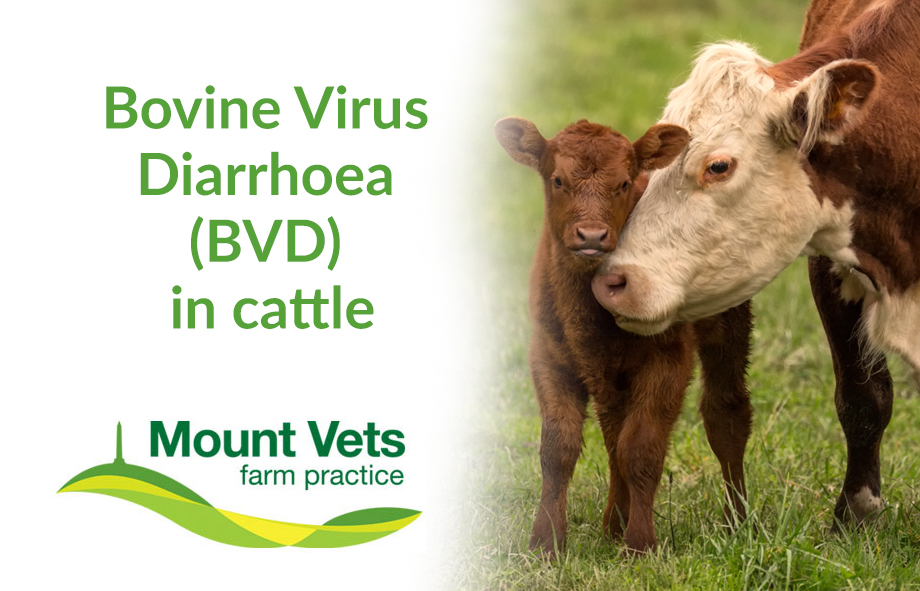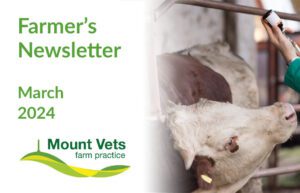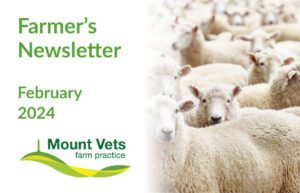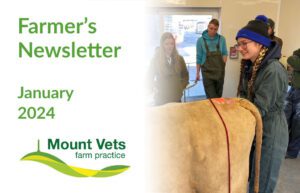What is Bovine Virus Diarrhoea (BVD)?
Bovine Virus Diarrhoea is a viral disease in cattle.
It is transmitted between cattle in nasal secretions, saliva or dung. In calves it can cause diarrhoea or may exacerbate other diseases (eg pneumonia). In adult cows it can also cause diarrhoea, although it may be asymptomatic.
BVD is a very significant infectious disease because of the effect it has on the reproductive efficiency of a herd.
If a naïve cow (ie not immune to BVD through vaccination or previous exposure) catches BVD when she is pregnant then one of three things will happen;
- If infected in late pregnancy she may well carry a normal healthy calf through to full term
- If infected in mid pregnancy then she will probably abort
- If infected in early pregnancy then she may carry the calf to full term.
This calf’s immune system was underdeveloped at the time of infection and was unable to recognise the BVD virus as a bug.
With no immune system to fight it the BVD virus flourishes within the calf and is continuously spread to in contact animals. This animal is known as a ‘BVD carrier’ or ‘PI=Persistently Infected’. A PI is usually stunted and grows poorly.
Mucosal disease
The BVD virus inside a PI often spontaneously converts to a killer strain, causing the death of the PI form a condition known as mucosal disease. This usually happens age 6 months – 2 years.
Clear identification and removal of PI cattle from a herd is vital if this disease is to be controlled.
Not all PI’s grow stunted and get mucosal disease, some may look normal and live a normal life in a herd, spreading large amounts of virus about (horizontal transmission).
If a PI gets pregnant and gives birth then her calf will always be a PI as well (vertical transmission).
There are effective vaccines against BVD. However a PI will not be ‘cured’ if she is vaccinated. Although she will be much less likely to spread BVD around in a vaccinated herd she could still pose a significant threat to younger cattle (scours, pneumonias).
The prevalence and costs of BVD
The cost of BVD to the UK cattle industry has been estimated at between £49 million and £120 Million per year.
There are many factors to look at when looking at the financial effects of BVD.
These factors include;
- Production losses
- Deaths
- Effect on fertility
- Increased replacement rate
- Reduced market value of stock
- Veterinary and treatment costs
- Effects on concurrent disease processes
- Increased labour costs and management time
The University of Reading has developed a sophisticated computer program that tries to take account of as many of these variables as possible before coming up with a figure for the financial effects that a disease will cause. These figures can never be exact but they do give us general idea of the costs.
Some examples from this computer program are given below;
Example 1:
A 150 Cow Dairy Herd that is BVD Naïve (ie no BVD infection and therefore no antibodies to BVD). A PI (Persistently Infected) heifer is purchased.
If diagnosis is prompt and vaccination of the breeding herd takes place in year 1 then losses are calculated to be £7100 over two years . If the outbreak is not detected and no testing or vaccination takes place until year 2 of the outbreak then losses over the two years are calculated to be £40,000
Example 2:
50 Cow Suckler Herd that is BVD Naïve until a PI (Persistently Infected) breeding heifer is purchased.
If no action is taken then losses over the next ten years are calculated to average £6600 per year. If a testing regime is put in place alongside a vaccination these losses can be reduced to an average of £400 per year.
* Please note the figures quoted above are correct at December 2012 and may have changed
Read up-to-date information on Bovine Virus Diarrhoea here: http://www.nadis.org.uk/bulletins/control-of-bovine-virus-diarrhoea-(bvd).aspx



